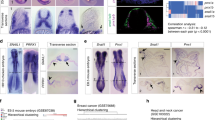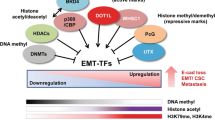Abstract.
The ZEB family of zinc finger transcription factors are essential players during normal embryonic development. One characteristic is that they induce epithelial to mesenchymal transition (EMT), a process that reorganizes epithelial cells to become migratory mesenchymal cells. E-cadherin is a major target gene of these transcriptional repressors, and this downregulation is considered a hallmark of EMT. In recent years, the involvement of the ZEB proteins in pathological contexts has been documented as well. Mutations in ZEB encoding genes cause severe syndromic malformations and evidence is mounting that links these factors to malignant tumor progression. In this review, we describe what is currently known on the molecular pathways these transcription factors are implicated in, and we highlight their roles in development and human diseases, with a focus on tumor malignancy.
Similar content being viewed by others
Author information
Authors and Affiliations
Corresponding author
Additional information
Received 05 August 2008; received after revision 24 September 2008; accepted 03 October 2008
Rights and permissions
About this article
Cite this article
Vandewalle, C., Van Roy, F. & Berx, G. The role of the ZEB family of transcription factors in development and disease. Cell. Mol. Life Sci. 66, 773–787 (2009). https://doi.org/10.1007/s00018-008-8465-8
Published:
Issue Date:
DOI: https://doi.org/10.1007/s00018-008-8465-8




